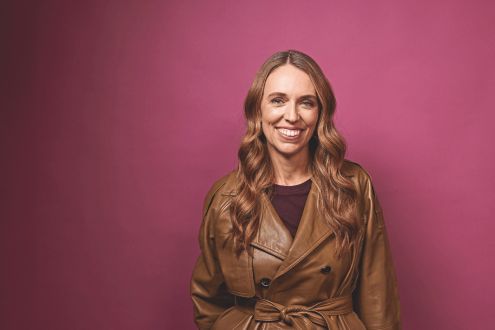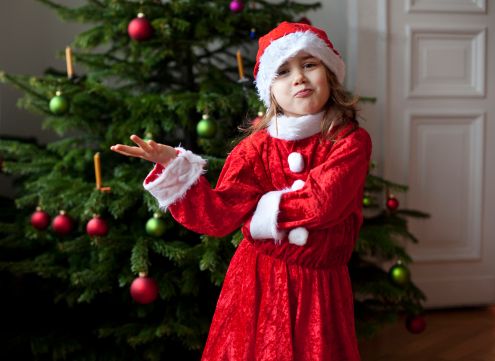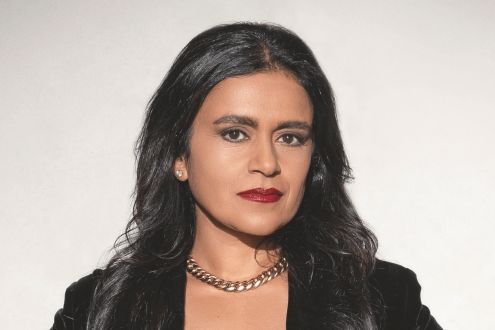‘I’m making space for women like me’: Nadiya Hussain talks school bullies, sexual abuse and her dreams of fostering children
She’s the runaway star of the Bake Off juggernaut, capturing our hearts with her humble charm, and now she’s conquering the US. The inspirational Nadiya Hussain still pinches herself at her success, but she’s honoured to be spearheading change
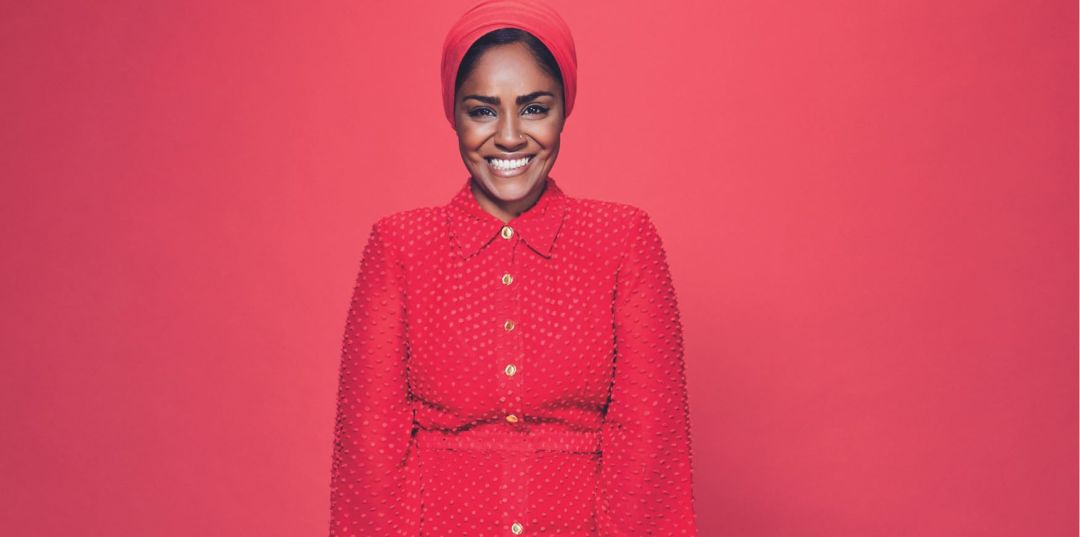
‘I’m like, “Who? Me? Are you kidding?”,’ Nadiya Hussain confides. ‘There are moments when I say to myself, “OK, this is silly now. You’re all playing a big prank!”’ Hussain first revealed herself to be a breath of fresh air when she delivered that goosebump-inducing ‘I can and I will’ speech on winning Bake Off in 2015. Since then, she’s hosted cookery shows, created a 90th birthday cake for the Queen, fronted a batch of BBC documentaries, released several bestselling cookbooks and a memoir, been awarded an MBE and become an icon of culinary creativity on a global scale.
I was in Louisiana, in the bayous on a boat looking for alligators, when the guy we were with turned to me and said: “My niece is texting to say she loves you.” I couldn’t believe it,’ recalls Hussain, when we meet over video call late one morning. ‘Another time, I was in a tiny independent chocolate shop and a lady came up to me, saying, “You sound like Nadiya…” and I’m like, “That’s because I am Nadiya!” – and she was so excited. I think of America as untapped territory – until I’m on the ground and I realise it’s not. America is quite the beast, so to have my books selling there is a big deal to me.’
One of the first in line for a copy of Hussain’s latest release might well be the Hollywood legend Arnold Schwarzenegger, with whom Hussain bonded backstage at The Graham Norton Show a few months before the pandemic hit. ‘He gave me a kiss and a hug and said “Well done!” and then followed me on Twitter,’ she says, shaking her head in disbelief.
For all her achievements, Hussain is no stranger to impostor syndrome, the mindset where people doubt their skills and fear being exposed as a ‘fraud’. ‘I’ve thought to myself, “Why am I successful?” In all honesty, I don’t have the answer,’ says Hussain. ‘I’ve been told in the past that it’s because I’m an ethnic minority, but often I think it’s luck. As women, we’re quite self-deprecating. There are two versions of me and we’re always fighting: one’s really positive and the other is really negative.’
Surely there’s no longer much for Hussain to be negative about? In The Great British Bake Off ’s 11-year history, no winner’s career trajectory comes close. The self-taught cook from Milton Keynes was a batch-cooking, stay-at-home mother of three before landing a place on the show, which her husband, Abdal, secretly applied to on her behalf. ‘It’s taken me a long time to get to a point where I believe that I’m good at what I do,’ says Hussain. ‘Now, after six years, I’m finally starting to see that I’m good at this thing, and successful because I do it wholeheartedly, with passion, and because I am always, always myself.’
And make no mistake, that person is wonderful company, even on the other side of a screen. One of Hussain’s most appealing traits is how she seasons her conversations with dry wit. When we discuss how Abdal, an IT specialist, is holed up with Covid, one week after the children were sick, and how Hussain miraculously sidestepped the virus, she says: ‘It’s already been accepted between my husband and I that I am superhuman.’
Then, on the subject of her birthday falling on Christmas Day, a day after her older sister’s birthday, she quips: ‘March was a fun time for my parents. Or boring. Perhaps there was no TV.’
As for her own marriage, Hussain and Abdal recently celebrated their sixteenth wedding anniversary. When she posted a photo on Instagram, with the words: ‘Sixteen years ago I married him because he had a gorgeous face and a good job. He still has both! Winning!’ fans and followers promptly declared #CoupleGoals. ‘Oh my goodness, we just get by,’ smiles Hussain, brushing off any fuss. ‘It’s amazing being head over heels in love with someone, but we have to do laundry, ironing and deal with moody teenagers. If we’re still smiling through all of that then, to me, that is real love.’
Before their arranged marriage, the Muslim couple had spoken frequently on the phone but had only met each other once – on the day they got engaged. Does Hussain feel lucky to have been matched with a man with whom she felt a genuine connection? ‘It took time, a lot of time,’ she explains. ‘We went through the lust phase, the can’t-get-enough-of-each-other phase, the “I don’t like your habits phase”, the “I don’t know if I like living with you any more” phase, the “we’ve had a child, let’s have another child to see if that fixes things” phase. We went through all those motions, just like any other relationship, but we were bound by our marriage and our commitment to our religion. I genuinely believe that because we made that commitment early on, we always worked at it. We couldn’t break up. I said, “We’re doing this. We’re not getting married again!”’
Only they did. In December 2018, Hussain and Abdal did ‘an official thing in the UK’ attended by only two witnesses, which was ‘as much about logistics as it was about love’. But she insists there are no plans to renew their vows alongside the family: ‘No. Our kids are at that age where everything is embarrassing,’ says Hussain, pausing before flashing a mischievous look. ‘Although, maybe we should just do it for the embarrassment factor!’
Hussain has spoken recently about her ovaries ‘pulsating’ every time she sees a new baby, but with three children – sons Musa, 15, Dawud, 14, and her 11-year-old daughter, Maryam – two cats, chickens, a budgie and fish to care for, she is not planning to carry another child, although that’s not to say she and Abdal won’t add to their brood non-biologically.
‘Long before Bake Off, I started my application for fostering children and got close to the end. Then I did Bake Off and everything went on the back-burner,’ she says. ‘It’s something that my husband and I have always talked about, because there are children out there who need a home. Whether it’ll ever come to fruition, I don’t know, but it would be lovely if it did.’
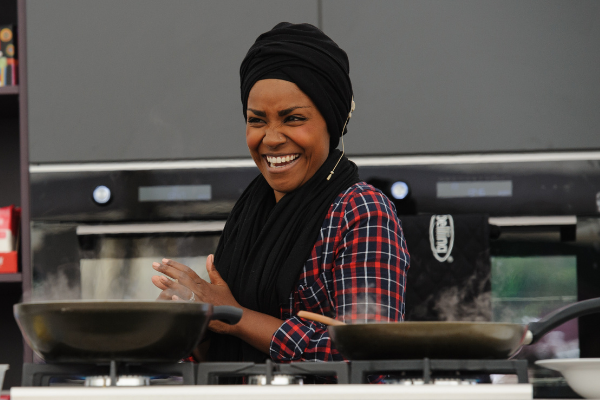 For Hussain, family has always been a priority and, save for the occasional three-week filming trip abroad, she is ‘happy to burn the midnight oil from Monday to Friday’ to preserve sacred weekend time with Abdal and the kids. The formula enables Hussain to live as normal a life as possible and, naturally, cooking features heavily. Hussain gets the kids involved wherever possible and happily reports that ‘repetitive’ jobs, such as podding peas, encourages them to tap into their emotions. ‘I always ask them, “Are you sad? Is there a reason why you’re sad? Do you want to talk about it?”,’ she says. ‘When they concentrate on something else, they tend to open up. In therapy, talking face to face can feel confrontational, so it’s better to talk side by side. We have our most interesting conversations in the car!’
For Hussain, family has always been a priority and, save for the occasional three-week filming trip abroad, she is ‘happy to burn the midnight oil from Monday to Friday’ to preserve sacred weekend time with Abdal and the kids. The formula enables Hussain to live as normal a life as possible and, naturally, cooking features heavily. Hussain gets the kids involved wherever possible and happily reports that ‘repetitive’ jobs, such as podding peas, encourages them to tap into their emotions. ‘I always ask them, “Are you sad? Is there a reason why you’re sad? Do you want to talk about it?”,’ she says. ‘When they concentrate on something else, they tend to open up. In therapy, talking face to face can feel confrontational, so it’s better to talk side by side. We have our most interesting conversations in the car!’
Growing up in a Bangladeshi community in Luton, Hussain’s childhood was far from idyllic. She describes her mother, Asma, as a ‘negative Nancy’ and says life was ‘just about survival’. At 10, she became a victim of school bullies who flushed her head down the toilet and repeatedly ‘smashed’ her fingers into door hinges, causing her fingernails to dislodge – behaviour she describes as ‘torture’.
Although the anxiety and panic disorder Hussain later developed is no longer ‘all-consuming’, she says haunting flashbacks occasionally knock her for six. Whenever she has a manicure, for instance, she is transfixed by her nails, which ‘grow at a weird angle’. Other times, the weekly bathroom clean is impossible: ‘I have days when I say to Abdal and the kids “I can’t do the toilet today”, so they do it instead. I’m lucky in that the kids really understand what the experience did to me,’ says Hussain, adding that both her boys have read her memoir, Finding My Voice (Headline, £10.99), so understand that she was also, at the age of fi ve, sexually abused by a relative in Bangladesh. ‘By reading my story, my boys really grasp what sexual abuse means. With everything that’s happening in the world right now, where women aren’t safe to walk the streets, it’s vital that they understand the importance of respecting women. And that it starts at home by respecting their mum and sister.’
On a wider scale, Hussain hopes her honesty will create a ‘ripple effect’ of openness in the Bangladeshi community where, she says, abuse is prevalent. ‘It is brushed under the carpet within the Bangladeshi community and it happens so frequently. Literally everybody I know, apart from one friend, has suffered some sort of sexual abuse at the hands of a relative or family friend. It’s a big problem and it was important to me to talk about it.’
Truthfully, no topic is off limits with Hussain, and why should there be when she is one of very few women of colour and faith on prime-time TV and in publishing? ‘I’m literally the only one of me,’ she says. ‘There wasn’t a space for me, so I had to create it, but that space is small and suff ocating, so it’s about making it bigger. By being present and consistent, I’m creating space for others. Whether they’re of colour, no colour, religion, no religion, or have self-doubt or mental health issues, they can look at me and say, “If she can do it, why can’t I?” I want to inspire people to get out there and embrace their differences as unique and special. It’s taken a long time for me to feel comfortable in my brown skin.’
While Hussain is encouraged by pledges from big corporations to improve diversity and inclusion, she says overall ‘progress is slow’. She describes a shocking incident in September, shortly after the twentieth anniversary of 9/11, when she and her daughter were verbally attacked as they walked to her brother’s house. ‘I ran to my brother’s place and Maryam was in fl oods of tears, saying, “I don’t understand why the man was shouting at us.” My sister-in-law took the words out of my mouth, saying, “We are who we are and we have to be proud of that.”’
She pauses… ‘I don’t want to say that you get used to it but, unfortunately, racist abuse becomes part and parcel of life. My kids have been called all sorts of names. People have made reference to the things that we eat in a negative way. The truth is I don’t think I’ll ever feel equal to my English counterparts.’
Hussain also doubts the future holds greater promise for her children. ‘They will always be on the back foot because of their name and skin colour. The only thing with which my sons might have a slight leg-up on my daughter is the fact that they’re men. My daughter is a girl, she’s Muslim, she’s a woman of colour.’ She adds: ‘This is why my career is about so much more than writing recipes. It is about existence and presence, and being part of a community that was never really made for me.’
Hussain’s vision for change knows no bounds. A few days before our interview, she was scrolling on Instagram and looking at pictures from the Met Gala and London Fashion Week. ‘I thought, “Imagine being able to go to the Met Gala” and then I thought, “Why is there no one like me on the catwalk at London Fashion Week?” – because all the models are very tall and there’s a box that everyone has to fi t into,’ says Hussain, who began ‘manifesting Met Gala and London Fashion Week’. She goes on: ‘We’ll see what happens. Maybe I just need to give someone cake and say, “Please let me do it!”’
Of course, there would be no arguing with a hunk of Hussain’s legendary Swedish princess torte, but something tells me it won’t be necessary: Hussain’s ‘I can and I will’ attitude has got this one covered.
Nadiya’s Fast Flavours (Michael Joseph, £22) is out now. The television series is on air now on BBC Two.
Words: Gemma Calvert
Photographs: Rachell Smith and Getty Images
